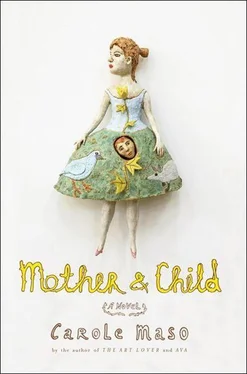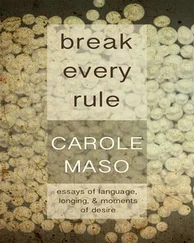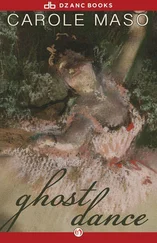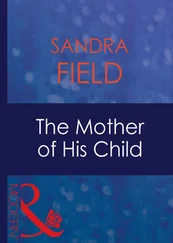INFANTS ARE CONVINCED that when their mothers leave the room that they have disappeared and are gone forever, never to return. When the child looked at her mother, she did everything in her power now to keep the outline of her solid and continuous and separate. She could not have her turning into birdsong or branches, or pond or stars or smoke.
What kept the mother together on many days was the child’s application of the Flicker Fusion Theory. In the theory her mother came together beautifully, fixed for extended moments at a time. She flickered, but then held, and then later would begin to flicker again. But it was the holding that was miraculous, and it brought both child and mother great joy. It was sad that the child had to resort to this, the Flickering Mother thought, and the child too thought that sometimes, and yet for those moments when the mother was held in perfect stability and presence, it felt like a supreme blessing. It was best to look on the bright side, the child always thought that. As a result of the Flicker Fusion, she and the mother possessed something that other mother-child states could never provide. As for the sadnesses — well, with the sadnesses they had made their amends.
There was always the Persistence of Vision Theory, the child reasoned when things got too difficult, the retina retaining the impression of the image even after her disappearance. This way, in long retinal waves the mother would remain for prolonged periods of time. Such were the ways the child would compensate for the times the mother would go off-again/on-again, off-again.
She knew never to take the solid world for granted because that, in the end, would be a source of much heartache. When the Disappearance Threshold had been reached, when the sense of absence seemed unbearable, when the Flicker-Off became more frequent and prolonged, the Persistence of Vision Theory was the natural theorem to apply. It pleased her to know what had to be done.
Still, the solitude of the night continued.
ON THE DAY the child came into language, she spoke elaborate sentences in an instant and the mother was afraid. No baby babbling or preliminary words had been heard, and there had been no practice or preparation on the child’s part. Just like that, one day, when the mother came into the room, she found the child speaking perfectly formed syntactic units, carrying their burden of meaning and desire.
The child said first how happy she was to be there. And the mother smiled sweetly. The very next words the toddler said were that she had come here from Heaven and that God was waiting for them. He could not wait much longer, she said, and they couldn’t live this way forever — between worlds, floating.
From time to time, the child went on, she would see God while sitting in her car seat in the car. The mother at these times would stop the car. She was not floating, and she didn’t care how long he waited; she was not going to budge.
Soon enough — not even a year had passed — and the child had forgotten all about what God had said in the car seat and about Heaven and about the hovering in-between world, but the mother never forgot it, and sometimes the child begged her to tell that first God story, which she had once overheard the mother whispering to Father Ted. The mother was not sure she wanted to be the repository for a story such as this, but after much badgering, the mother always relented. Still she longed sometimes for the days when the child was a wordless creature and did not ask the mother to hold such things for her.
Now they were exiles in language together and forced to make the best of it; now they would have to make small reductive signs for the oceanic ways they felt inside. Now they would have to sputter after the wolf and its majesty, and the river, and the fire. But beside this world there was another world that there were no words for.
The funnels would come quickly now — all the dark diminishments, the mother and child, caught in the high winds. The mother could not blame the child for learning to speak. The child was exhilarated and did not see or feel what the mother did. The child was enlarging and talking a blue streak. She could not blame the child for going forward: talking, walking, going to school. Bringing home the child with the Elephant Trunk, and the Girl with the Matted Hair, or telling the God story. It was not really her fault.
God was pulling at the child, asking her to bring the mother home. Instructing the mother to get on with it now.
Still, the mother implored the God to leave the child alone .
THE JACKAL LEADS the deceased before the scale. He weighs the heart (left tray) against the feather of Ma’at, the goddess of truth and justice (right tray). If the heart of the deceased outweighs the feather, then the deceased has a heart that has been made heavy by evil deeds. In that event, the god with the crocodile head and hippo legs will devour the heart, condemning the deceased to oblivion for eternity.
And that indeed, the mother says, is a long time. The War Crimes President is moved into the withdrawing room with a heavy heart. The jackal snatches the heart and puts it on the scale.
WOMEN IN VEILS moved through the Valley now. There had always been veiled women in the Valley, draped in black, and now as the vanishings increased, women mourned in greater and greater numbers — but these veiled women who moved through the Valley were new. The new women came from far away, though from where, the mother could not say.
One of the women in veils breaks from the group and walks down the path to the mother. She might have been a kind of beekeeper had there been bees. For the first time in a long while, the mother was being pulled against her will toward another human being. What do you want? she asked. Each night when the mother awoke, the veiled woman would be sitting at the edge of the bed, next to a chittering bat, beckoning.
THE CHILD WAS doing a report about a faraway land. The child asked the mother what she knew about it.
Music and singing and dancing are forbidden there. Write that down, the mother said. It’s something I know for sure.
I won’t. I won’t write that, the child said; it’s too sad.
LISTEN, THE MOTHER whispers. At the end of the corridor a dirge could be heard moving through the left ventricle. Give us the courage to enter the song, the mother said, and they fell now with grace and resolve and some fear into the darkest of dreams:
A young woman from Punjab and her baby trail the mother and child, and no matter what the mother does, she cannot completely shrug off their shadow. Even though she does not understand why this young woman and infant boy from a distant land must follow them, she tolerates it — they must be looking for something very important, she reasons. Or perhaps it is simpler — perhaps they have been drawn by the great silver river, like so many are drawn. The woman from Punjab mutters sometimes, sometimes sings in an incredibly lovely voice, sometimes wails, but all without sound, and the infant boy cries at times and sleeps the rest of the time.
Inevitably at some point in every day, the young woman from Punjab and the baby appear, though some days it is very late. Sometimes the mother goes to look for them and if she cannot find them, she goes back home and waits for them to come. She knows it must be a far place they journey from; her hunch is Punjab, though she cannot be sure.
She notices that more and more, the woman, when she arrives, is crying. The mother remembers how difficult it was when her own child was a baby, and she also understands how difficult it must be for them to be so far from home. If she could only verify their existence, then perhaps there would be a shift in their rapport, in their relationship to one another, in what could be communicated. The mother does not dare ask the child about them, as she is not prepared for the answer the child will give, and also she does not want to hear what it will sound like to ask the child casually, have you by any chance seen the woman and the baby from Punjab today? If the young woman and baby are invisible, it is not on the mother’s account. Some days she sees them everywhere she looks. The baby seems to know sign language, as so many babies seem to know these days, and the mother feels he is trying to tell her something urgent, but she does not know what.
Читать дальше












